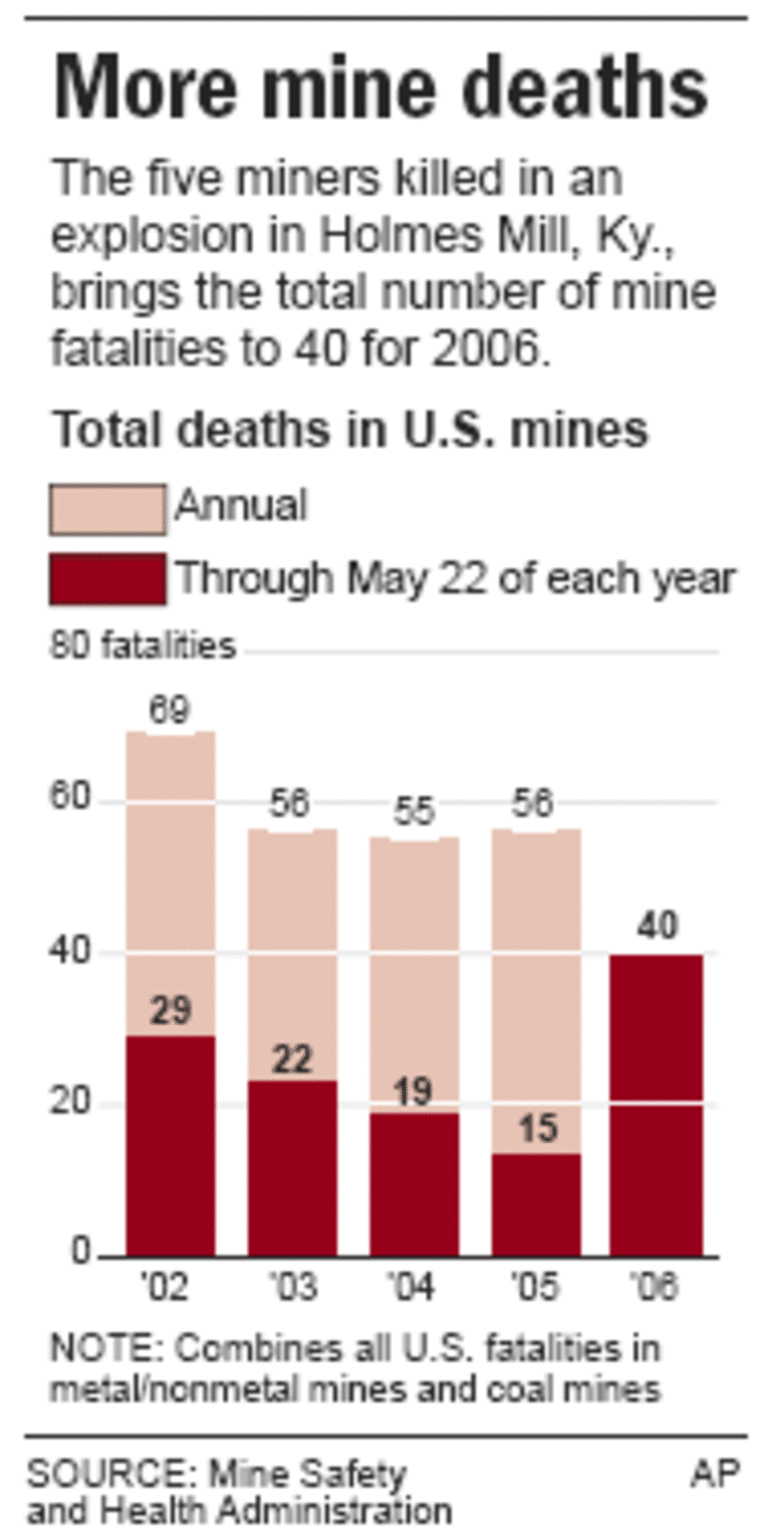Three of the five miners killed in an explosion in an eastern Kentucky coal mine likely survived the initial blast but died of carbon monoxide poisoning, a coroner said Sunday based on preliminary autopsy results.
The other two miners died from multiple blunt force trauma and heat injuries, probably because they were closer to the Saturday blast, Harlan County Coroner Philip Bianchi said.
The cause of the blast at the Darby Mine No. 1 in Harlan County remained under investigation. Officials worked to repair the ventilation system so investigators on Monday could enter the mine, where pockets of methane gas were a concern.
The underground mine, operated by Kentucky Darby LLC, is about 250 miles southeast of Louisville near the Virginia border.
Amon Brock, 51, and Jimmy D. Lee, 33, died from injuries sustained in the explosion, the coroner said.
Roy Middleton, 35; George William Petra, 49; and Paris Thomas Jr., 53, survived the blast but were suffocated by the poisoned air, Bianchi said.
Bianchi said officials may be able to determine how long the three miners lived before they succumbed, but that would depend on their toxicology tests. He did not give a timetable on when those results would be available.
Families outraged
The initial reports infuriated family members.
“It makes me upset that he smothered to death,” Mary Middleton said about her husband. “They need to have more oxygen for them.”
Officials are investigating whether the breathing devices, the self-contained self-rescuers, used by the miners were working properly.
“What they told me was when they found my husband, he had the rescuer on, and he was trying to get out,” said Tilda Thomas.
“I just think all miners everywhere need bigger oxygen supplies. The rescuers only have an hour supply, even if they work at all.”
Paul Ledford, the lone survivor, told his brother his breather only worked for about five minutes.
“It’s about having something to survive, they need to keep up with the technology,” Jeff Ledford said. Ledford survived by crawling away from the blast. Rescuers eventually found him.

Kentucky legislators, responding to the deadly accidents at mines across the country, including January’s disaster that killed 12 miners at the Sago Mine in West Virginia, passed a measure requiring mines to store breathing devices underground, and to set up lifelines to help miners find their way out. But the law doesn’t take effect until July.
A U.S. Senate panel last week approved a bill that would require miners to have at least two hours of oxygen available instead of one as under the current policy. It also would require mine operators to store extra oxygen packs along escape routes.
Though it wasn’t clear whether the proposed legislation would have made a difference at the mine in Holmes Mill, some said the coroner’s findings show a need for improved oxygen supplies.
“It does sound like they didn’t have enough oxygen readily at hand,” said Phil Smith, a spokesman for United Mine Workers of America, which supports legislation that would increase miners’ oxygen supplies.
'Common sense' mining requirements
“These are just common sense things that ought to be done,” Smith said of the proposed requirements.
On Sunday, the surrounding community prayed for the dead miners and their families at regular worship services.
About two dozen people gathered at the Closplint Church of God in Harlan County, not far from the mine.
“We lost some friends yesterday. Some wives lost husbands. Some sons lost fathers. It’s really sad,” said Stevie Sizemore, a Harlan County miner who said he was friends with all the victims.
Since Kentucky Darby took over as operator in May 2001, there had been 10 injuries and no deaths at the mine until Saturday, according to the U.S. Mine Safety and Health Administration, which had been in the process of a regular inspection of the mine.
Saturday’s explosion was the deadliest mining incident in the state since 1989, when 10 miners died in a western Kentucky mine blast, state officials said.
The national death toll from coal mining accidents is now 31 this year, with 10 of them in Kentucky.